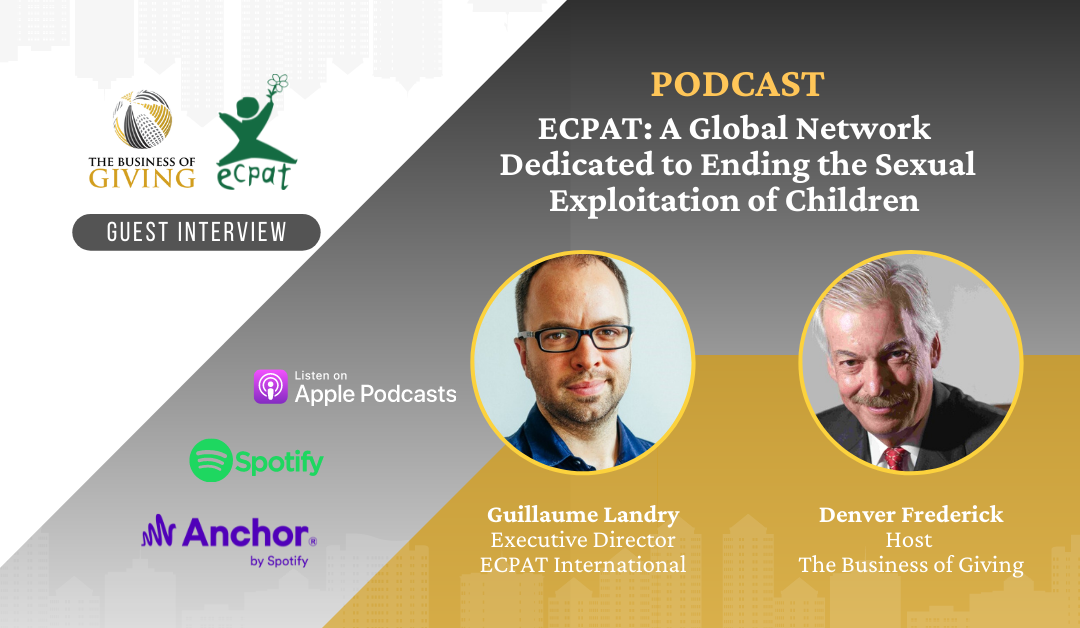
Image credit: The Business of Giving 2022
Highlights from a podcast feature by ECPAT Executive Director, Guillaume Landry, on ECPAT’s work in the field of child sexual exploitation
In April 2022, ECPAT’s Executive Director joined Denver Frederick, host of The Business of Giving Podcast, in a discussion on ECPAT’s work, the impact of our members, and the global trends ECPAT’s research has uncovered in the field of child sexual exploitation.
Listen to the full episode below, as published by Denver Frederick.
It’s a tough question, because everyone would like big figures that demonstrate the magnitude of the issue, but we’re addressing something that is underreported or underexamined.
Globalisation has led to more children becoming at risk of child sexual exploitation across the world. From pre-pandemic levels of travel and tourism to the growing presence of technologies in the lives of children that expose them to grooming, sextortion, and other forms of online exploitation, there are more avenues putting children at risk of harm than ever before.
Research into various aspects of child sexual exploitation, such as trafficking for sexual purposes and the technology-facilitated exploitation of children, echoes this sentiment.
But there is also good news in some regions of the world, where child marriage is becoming less prevalent.
“…everyone would like big figures that demonstrate the magnitude of the issue, but we’re addressing something that is underreported or underexamined”
Voluntourism is a growing trend. In such environments with little to no regulations and safeguarding measures in place, we’re seeing increases in cases of children being sexually exploited.
Previous research has been focused on the sexual exploitation of children in tourism, whereby perpetrators would travel from one country to another to commit such crimes. However, we’ve learnt that perpetrators are now also travelling domestically within their own country. This could be people in the transport industry, humanitarian diplomats, or military personnel.
People’s purpose for travelling is also evolving. Voluntourism, packaged tourist trips for people to participate in voluntary work that typically involves children, is a growing trend. In such environments with little to no regulations and safeguarding measures in place, we’re seeing increases in cases of children being sexually exploited.
As a parent, when you buy a car, you don’t check if the safety belt is well-built… it’s part of the trust. Similarly, when you use the Internet, you shouldn’t be responsible for checking if everything is safe for children. It doesn’t make sense.
What’s fantastic is at the moment, we’re seeing a movement of change. The United States, United Kingdom, Canada, Australia, and more recently the European Union, have begun examining new regulations to hold the technology sector—social platforms, the gaming industry and service providers—accountable.
Most of these businesses have operated under the approach of self-regulation and voluntary action. Just by the sheer number of cases of child sexual abuse material online, we can see that it has evidently failed.
We’re now in an era where regulation is a necessity, not an option. The technologies to protect children online exist, and the technology sector needs to work together with governments to ensure children’s right to privacy and protection online.
As a parent, when you buy a car, you don’t check if the safety belt is well-built… it’s part of the trust. Similarly, when you use the Internet, you shouldn’t be responsible for checking if everything is safe for children. It doesn’t make sense.
We’ve learnt that the services available, even in societies that have resources, are not adapted to deal with the different trajectories and experiences that boys have.
Greatly. Gender norms influence the sexual exploitation of children in several dimensions.
Mainly, perpetrators target girls for sexual exploitation purposes because of their gender. Societal and gender norms teach us that we can tolerate that girls are exposed to more risks in society because of their gender. Everywhere, we see girls being constantly, repeatedly, and systematically exposed to those risks and exploited for that reason. They also face revictimisation when accessing support services that they should and have a right to access.
Another important aspect is that boys, too, can be subjected to exploitation. However, harmful gender norms in many societies, such as the taboos associated with discussing sex, often leave no space for boys to seek help. This also results in a lack of support services available for boys.
We’ve learnt that the services available, even in societies that have resources, are not adapted to deal with the different trajectories and experiences that boys have. When you look at the gender dimension, there’s a lot of complexity, and we fail to address those realities.
In most places, the police are reactive, showing up when needed, but they’re not a driving force. This needs to change.
One of the initiatives that I’m really excited about is focusing on the role of the police. What we’re seeing is that police are not proactive members of the discussion around prevention strategies. They’re usually brought on at the end of a conversation to enforce something, rather than prevent it.
Given their proximity to people and children, the police have the potential to be a source of protection and trust. How can we include police in the bigger picture of a community policing approach?
There is an opportunity to shift our mindset here, but we need a strategy for this. In most places, the police are reactive, showing up when needed, but they’re not a driving force. This needs to change.
Click here to read the transcript and learn more about The Business of Giving Podcast.
Ending the Silence’ is a podcast by ECPAT International, an organisation dedicated to ending the sexual exploitation of children. In the podcast, we explore what the key issues are, delve into global trends, and meet the experts, who are dedicating their lives to making the world a safer place for children. Click here to listen.